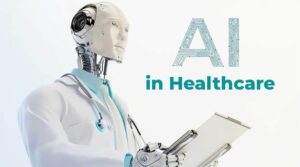The use of artificial intelligence (AI) in healthcare is changing everything. It creates new ways to improve patient care, make operations run more smoothly, and discover patterns in large amounts of health data. But as we go through this life-changing process, we are also faced with several issues that need to be resolved before artificial intelligence can be fully applied in healthcare. It discusses the changes taking place in AI health and identifies both the good things that are possible and the problems that still need to be solved.
The beginning of AI in healthcare
The use of artificial intelligence in healthcare is a big step towards more personalized, effective, and informed care. Artificial intelligence has many different applications in healthcare, from diagnostic algorithms that detect diseases with extreme accuracy to predictive analytics that predict outbreaks and patient outcomes. This technology is not only changing the way we treat and diagnose but also changing the foundation of healthcare services around the world.
Opportunities in the AI Health Landscape
Enhancing Diagnostic Accuracy
One of the most important things AI can do is improve diagnostic accuracy. When using large amounts of medical images for education, machine learning algorithms can find patterns that humans cannot see. This capability is especially important in areas such as radiology and pathology, where a quick and correct assessment can have a huge impact on patient performance.
Customized care
Artificial intelligence is at the forefront of developments in personalized medicine, which can tailor treatment plans to each person’s genes, lifestyle, and environment. AI algorithms can look at data from different sources to figure out how different patients respond to different treatments. This makes more targeted and effective care possible.
Operational efficiency
Artificial intelligence applications make medical center operations more efficient. Artificial intelligence frees up time and resources so healthcare providers can focus on what they do best: caring for patients. This is done by automating administrative tasks and improving patient flow.
Challenges in the AI Health Landscape
Data Privacy and Security
As artificial intelligence becomes more widely used in healthcare systems, concerns about data protection and privacy become even more important. Teaching AI algorithms requires large amounts of data, raising concerns about patient privacy and the potential for data breaches. In the AI health space, it is important to ensure that strong security measures are in place and patient trust is maintained.
Ethical issues to think about
The use of AI in healthcare also raises many thorny social issues. Life and health decisions once made by humans are increasingly influenced by algorithms. This change raises important questions about accountability, bias, and how artificial intelligence could increase health inequities.
Integrate and work with other systems
Adding AI to existing healthcare systems and ensuring that different technologies and data sources can work together are difficult tasks. To get the most out of AI, everything must work together smoothly. This requires significant infrastructure spending and ongoing support to ensure everything works together and data can be shared between platforms.
Discover where AI is going in healthcare
Despite the problems, artificial intelligence has a bright future in healthcare. As AI technology continues to develop and people become more aware of social and practical issues, it opens the door to new solutions to address these issues. To realize the advancement of AI in healthcare, technologists, healthcare professionals, policymakers and patients must work together.
Conclusion
As we enter the field of AI health, we face both enormous opportunities and enormous problems. As we continue to explore this exciting new frontier, we must remain focused on harnessing the power of artificial intelligence to improve health outcomes, while remaining cautious and prepared for ethical, privacy, and integration issues that arise. The ultimate goal is a healthcare system that is not only better and more efficient but also more equitable and accessible to all.
FAQs
1. How will artificial intelligence change healthcare?
Through predictive analytics, machine learning algorithms, and robot support, artificial intelligence is transforming healthcare by making diagnoses more accurate, personalizing treatment plans, and improving patient care. It also ensures that hospital operations run more smoothly. These technologies make it possible to detect diseases early, tailor treatments based on each person’s genetic profile, and automate routine tasks so that doctors and nurses have more time to care for patients.
2. Can Artificial Intelligence Replace Human Doctors and Nurses?
No, AI will not replace human doctors and nurses. Rather, it is a powerful tool that helps them do their jobs better and allows them to focus on the more difficult and caring aspects of caregiving. AI can automate routine tasks and quickly assess data, but it lacks the empathy, moral judgment, or human touch that is so important in healthcare.
3. How can patients ensure that their information is used properly in AI healthcare applications?
Patients should ask healthcare providers and AI applications about their data privacy policies to ensure that their data remains secure, anonymous, and used in a manner that complies with all laws and regulations. Ensuring they understand how their data can be used for AI-driven care and that they can give informed consent are also very important steps.
4. What new things do you think artificial intelligence will bring to medical healthcare in the future?
In the future, there could be smarter AI algorithms for early disease detection, more accurate robotic treatment systems, mental health support powered by AI, and more using AI to monitor your health status daily via wearables and mobile apps. Artificial intelligence can also be very useful in solving global health problems, such as controlling epidemics and making medical care more accessible to people in underserved areas.
5. How can AI-based tools help solve health problems around the world?
Global health gaps can be bridged by AI-driven technologies that provide low-cost diagnostic tools, enable remote care delivery and fully deploy resources where needed. By making healthcare more accessible and effective, AI can help reduce the health gap between regions and social classes.
